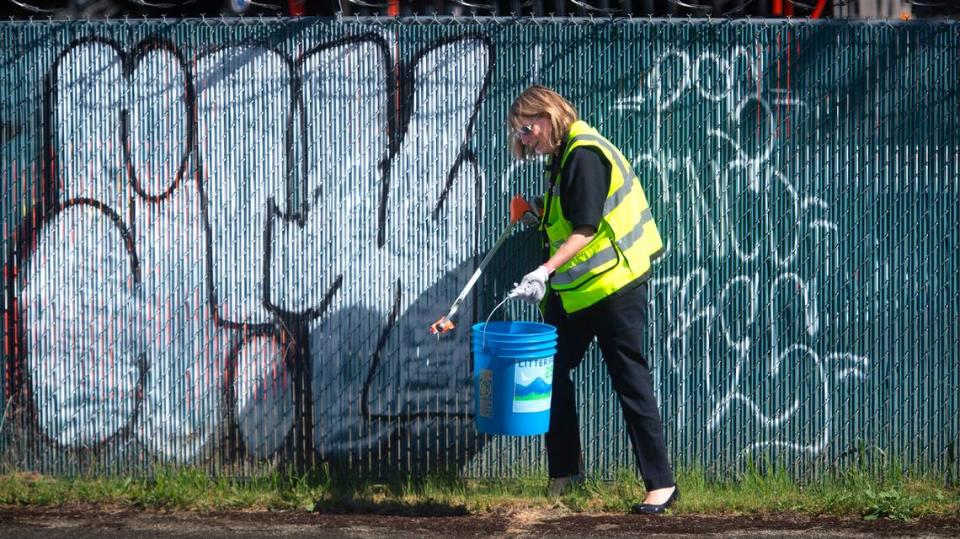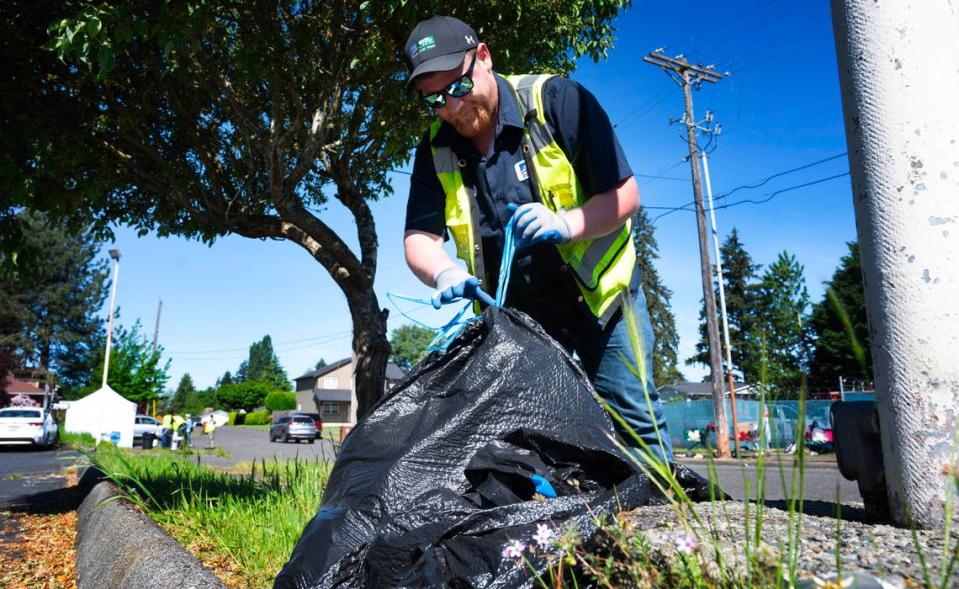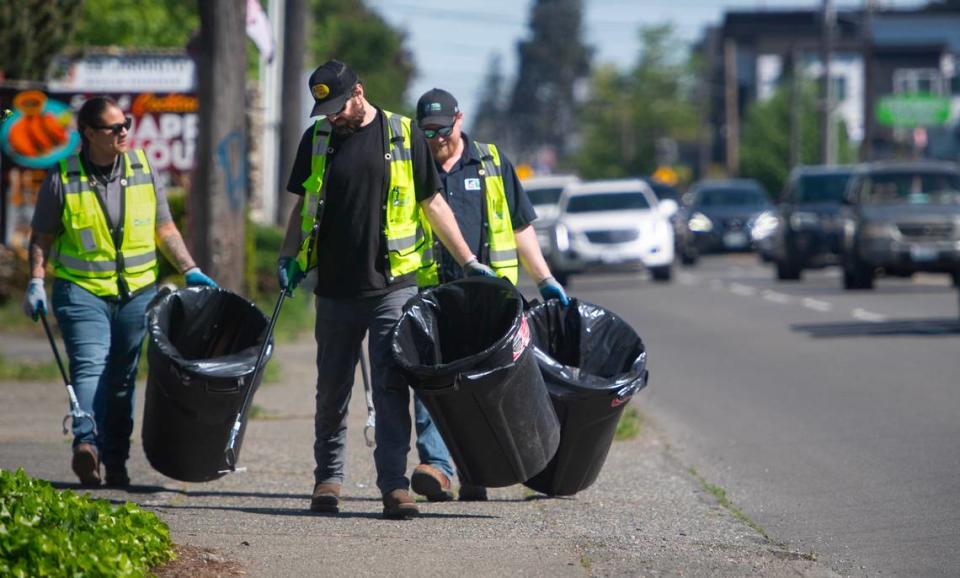Tacoma ups penalties for littering. Some worry the law could hurt people already down
Tacoma has new litter rules aimed at “right-sizing” penalties. While most everyone can agree that littering is bad, some remain skeptical of the code changes that took effect Monday.
Deputy Mayor John Hines noted that the ordinance, passed unanimously April 30, imposes proportional punishment based on the amount of trash and that it better aligns with state law. He prefers that Tacoma’s “Grit City” nickname apply to its gumption, not its appearance.
“Tacoma has had this reputation as being the ‘gritty city,’ and we are a beautiful place,” Hines, who spearheaded the changes, told The News Tribune. “So this is something we can do; it’s one piece of it.”
The ordinance distinguishes potentially harmful trash, such as glass, needles, tobacco products, nails and human waste that can spur injury or damage. Dangerous-litter violators risk a Class 1 civil infraction, according to the city’s updates.
Tiered penalties now will be applied based on how much litter has been dumped. Rule breakers will either have to cough up a fine or clean up the mess themselves.
Changes include adopting the state’s penalty and definition for potentially dangerous litter, according to a city news release. The state’s fee structure for litter infractions “as an alternative to a criminal misdemeanor charge” is, according to an April 17 City Council action memorandum:
“Up to $250 for a person found liable of littering between one cubic foot and one cubic yard of material;
Up to $750 for a person found liable of littering more than one cubic yard and less than seven cubic yards of material; and
Up to $1,000 for a person found liable of littering between seven and 10 cubic yards of material.”
Council member Joe Bushnell, who co-sponsored the ordinance, pointed out in a city news release that the updates will work to “right-size” littering penalties and help hold violators to account.

Another co-sponsor, Council member Sarah Rumbaugh, underscored in the news release that public education works to deter littering. She argued the changes will help the city take aim at the large-scale dumping that tarnishes quality of life.
Tacoma’s litter code was last updated in the ‘90s, and it didn’t reflect the volume of trash being left on streets today, Hines said — particularly when it comes to large-scale dumping. Before, a truckload’s worth of littered soda bottles would incur a $50 fine. The same penalty would apply for just a single can of Coke.
Hines said it costs more than $50 to deliver a truckload of debris to the solid-waste transfer center. Under the old rules, there wasn’t an incentive to responsibly get rid of the waste compared with just tossing it on the streets.
The new law means a person who catapults a McDonald’s bag from a car won’t get hit with the same punishment as someone who abandons a couple propane tanks. The first item is a “nuisance” but the second is potentially dangerous, Hines said.
While smaller-scale litterers will no longer face criminal penalties, big-time bad actors can now get slapped with a gross misdemeanor.
Community response to the new ordinance
Tacomans don’t like litter. Over the past decade, 20% of the top 10 TacomaFIRST 311 requests reflected complaints of illegal dumping, garbage and debris, according to the April 17 City Council action memo.
The city has launched other efforts aimed at beautifying dirty streets, such as the Tidy-Up Tacoma program. A separate campaign, “If it hits the ground, it hits the Sound,” acts to spread awareness about refuse entering the storm-drain system and its effects on the surrounding water.
Litter is linked to perceptions of public safety, Hines said: Trash-free streets make neighborhoods feel safer.
Still, not everyone is a fan of the new rules.
The Tacoma Trash Pandas told The News Tribune that the council members deciding the code updates are “castes away” from their constituents. The anti-litter group wants to see an expanded Purple Bag Program, which helps to pick up waste from Tacoma homeless encampments.
The Tacoma Trash Pandas are pushing for free, accessible public dumpsters.
“If the people who run this city want to have [a] positive impact on the land and the people, they can,” the Trash Pandas wrote via Instagram message. “The steps toward less litter and dumping in Tacoma are simple, and they don’t involve punishment — they involve access.”

Andrea Haug with the trash-cleanup group Litter Free 253 told The News Tribune that volunteers sometimes uncover off-the-wall items. Haug once found and kept a cement beagle with “really scary marble eyes,” for instance. Other times volunteers have encountered drug-related trash like foil or needles.
Haug is dubious of how much the ordinance will mitigate the underlying problem. Low-income tenants will continue getting evicted, meaning belongings thrown to the curb (including big items like box-springs and mattresses) might get classified as litter, she said. Food banks will keep giving boxes of grocery items to people experiencing homelessness who can’t store anything on the streets.
City spokesperson Maria Lee said that the city provides a free service related to encampment cleanup to store the personal belongings of residents who are unhoused.
The way Haug sees it, fines are old-fashioned and could impose further harm on those already vulnerable.
“We’re not fining our way out of this issue,” she said. “We need to change how we view things and how we operate. … We really need to look at disposal differently.”
Haug wants to see more trash cans in Tacoma so that residents can properly dispose of their waste. In her experience, folks gravitate toward the bin or ashtray when it’s there. The city could also use more public bathrooms, she said.
One of Tidy-Up Tacoma’s goals, Hines said in a follow-up interview, is expanding the number of trash cans. Public restrooms are another “critical component,” he added: “Part of our outreach in trying to connect people to shelter and housing is about getting [them] access to those things.”
Jessica Tweed, founder of the volunteer-based trash pick-up group Oscar’s Enemies, told The News Tribune she appreciates that Tacoma saw a need for code updates and took action. The city has many great resources for people and businesses that “could be more effectively publicized,” she said. Questions remain as to how the ordinance will be enforced.
“A concern would be that, potentially, the folks who may be contributing most to illegal dumping may not have access to resources that could reduce littering and illegal dumping,” Tweed added.

The city won’t look to ticket people for littering when they require shelter and housing, he said.
Even if everyone were housed, Tacoma would still have a littering problem, he said. The update was meant to tackle larger-scale dumping, with penalties increasing according to volume.
While Hines understands there are concerns about the punitive nature of the ordinance, he emphasized that it strips the criminal penalty for small litter amounts and moves it to a civil infraction. He also highlighted that violators can do restitution in lieu of having to pay.
Next steps for the city include spreading awareness about the new penalties and moving toward enforcement, Hines said.
“But I mean, the end goal for me is less enforcement and less littering, right?” Hines said. “We’re hoping that it’s just a single, ‘Don’t litter in the first place.’”

